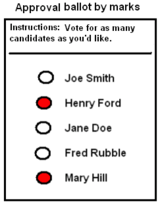
So it's like this.
If you and 5 friends are trying to decide where to go for lunch and 3 of you say you're okay with Whataburger or Five Guys, 2 of you say you're okay with Five Guys or In-N-Out Burger, and 1 of you says you are only okay with In-n-Out, you should go to Five Guys, because the most people approved of it.
If you only got to choose one to approve of, and you really preferred Five Guys, but you know that friend who wants In-N-Out has a history of bullying or bribing others to help him get his way, you may feel compelled to band together and vote for Whataburger, as they've had a history of winning, and you don't want to "split the vote." In this case, maybe 4 vote Whataburger and 2 vote In-N-Out and 0 vote Five Guys. This is not an accurate representation of the group, in which 5 approve of Five Guys, but a decision made out of fear from some that they'd get stuck with In-N-Out.
In a US presidential election there are usually 3 (if not more) names listed on a ballot; a Democrat, a Republican, and a Libertarian or Independent. Polls show that at least 42% of Americans do not affiliate with either the Democrat or the Republican, and many express approval for policies of the Republican and the Libertarian, or the Democrat and the Libertarian. However - history and a single vote causes the majority to stick with a tribe and vote in defense against the one they don't approve of.
The lesson: Approval Voting is a better form of voting to fully express your opinion, and Five Guys is better than In-N-Out.